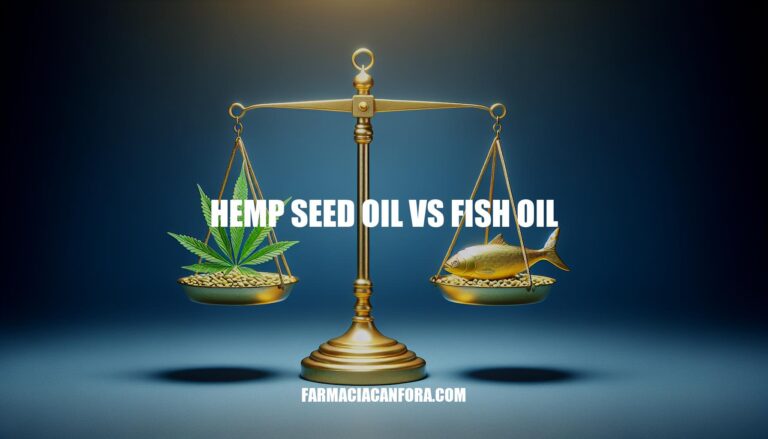Hemp seed oil and fish oil are two popular supplements known for their health benefits. Comparing them is important because each offers unique nutrients and advantages. Understanding their differences can help you choose the best option for your specific health needs.
Nutrient Composition
Here’s a concise comparison:
Hemp Seed Oil:
- Omega-6 to Omega-3 Ratio: 3:1, which is considered optimal for human health.
- Omega-6 Fatty Acids: High in linoleic acid and gamma-linolenic acid (GLA), beneficial for skin health and inflammation.
- Omega-3 Fatty Acids: Contains alpha-linolenic acid (ALA), but in lower amounts compared to fish oil.
Fish Oil:
- Omega-6 to Omega-3 Ratio: Higher concentration of omega-3s, particularly EPA (eicosapentaenoic acid) and DHA (docosahexaenoic acid).
- Omega-3 Fatty Acids: Rich in EPA and DHA, crucial for brain function, heart health, and reducing inflammation.
- Omega-6 Fatty Acids: Lower in omega-6 compared to hemp seed oil.
Key Differences:
- Hemp Seed Oil: Balanced omega-6 to omega-3 ratio, more omega-6 fatty acids.
- Fish Oil: Higher omega-3 content, especially EPA and DHA, lower omega-6.
Health Benefits
Heart Health
- Hemp Seed Oil: Contains a balanced ratio of omega-3 and omega-6 fatty acids, which can help reduce blood pressure, improve cholesterol levels, and decrease the risk of heart disease.
- Fish Oil: Rich in omega-3 fatty acids (EPA and DHA), which are known to lower triglycerides, reduce blood pressure, and decrease the risk of heart attacks and strokes.
Brain Function
- Hemp Seed Oil: Contains polyphenols and essential fatty acids that may protect the brain from inflammation and support overall brain health.
- Fish Oil: High levels of DHA in fish oil are crucial for brain health, improving cognitive function, and potentially reducing the risk of neurodegenerative diseases.
Inflammation
- Hemp Seed Oil: Rich in gamma-linolenic acid (GLA) and omega-3 fatty acids, which have anti-inflammatory properties that can help reduce chronic inflammation.
- Fish Oil: Omega-3 fatty acids in fish oil are well-known for their strong anti-inflammatory effects, helping to reduce inflammation and alleviate symptoms of inflammatory diseases.
Both oils offer significant health benefits, but the choice between them may depend on your specific health goals and dietary preferences.
Potential Side Effects
Hemp Seed Oil
- Common Side Effects: Digestive issues such as diarrhea, nausea, and abdominal cramps.
- Contraindications: Generally safe, but those with allergies to hemp should avoid it.
Fish Oil
- Common Side Effects: Fishy aftertaste, nausea, diarrhea, belching, bad breath, heartburn.
- Contraindications: Those with fish or shellfish allergies should avoid fish oil.
If you have any specific health concerns or conditions, it’s always best to consult with a healthcare provider before starting any new supplement.
Sustainability
Hemp Seed Oil:
- Environmental Impact: Minimal water and fertilizer requirements, pest and disease resistant, reduces greenhouse gases, and does not disrupt ecosystems.
- Resource Availability: Grows in diverse climates, high biomass yield per acre, and renewable.
Fish Oil:
- Environmental Impact: Contributes to ocean pollution, reduces fish populations, and impacts marine ecosystems.
- Resource Availability: Dependent on fish populations, which are declining due to overfishing.
Hemp Seed Oil vs Fish Oil: Understanding the Benefits
Hemp seed oil and fish oil are two popular supplements with unique benefits. Hemp seed oil has a balanced omega-6 to omega-3 ratio, high in linoleic acid and GLA, beneficial for skin health and inflammation. Fish oil is rich in EPA and DHA, crucial for brain function, heart health, and reducing inflammation.
Heart Health Benefits
For heart health, hemp seed oil’s balanced fatty acids can help reduce blood pressure and cholesterol levels, while fish oil’s omega-3s lower triglycerides and risk of heart attacks. For brain function, hemp seed oil contains polyphenols and essential fatty acids that protect the brain from inflammation, whereas fish oil’s high DHA improves cognitive function.
Anti-Inflammatory Properties
In terms of inflammation, both oils have anti-inflammatory properties, but fish oil is more effective due to its higher omega-3 content. Hemp seed oil is generally safer with fewer side effects, while fish oil can cause digestive issues and allergic reactions in some individuals.
Environmental Impact
Considering environmental impact, hemp seed oil has a minimal ecological footprint, requiring less water and fertilizer, and being pest-resistant. Fish oil, on the other hand, contributes to ocean pollution and impacts marine ecosystems.
Choosing the Right Oil for You
Ultimately, hemp seed oil is better suited for those seeking a balanced fatty acid profile and skin health benefits, while fish oil is ideal for individuals prioritizing brain function and heart health. However, it’s essential to consult with a healthcare provider before starting any new supplement, especially if you have specific health concerns or conditions.


